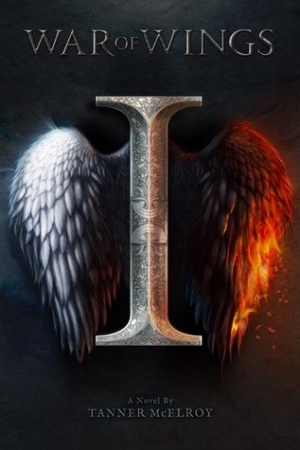War of Wings
The motivations of angels Gabriel and Lucifer are intimately portrayed, exposing their character flaws—as well as flaws universal to humankind.
The word “epic” gets thrown around a lot these days, but War of Wings by Tanner McElroy is truly an epic novel. It contains most of the elements of a traditional epic: a flawed hero with extraordinary strength, a vast setting that spans the cosmos, otherworldly beings, divine intervention, and a descent into the beginnings of Hell. Using cinematic scenery and charismatic characters, McElroy crafts a compelling story of restlessness, love, betrayal, and loyalty.
Before man, there were angels. Heaven is a place of perfection and light. Not all is well with the world, though, as Gabriel yearns for the excitement of imperfection, and Lucifer yearns to be God’s equal. When neither angel gets what he wants, each questions his place in Heaven. As reason threatens to overtake faith, the angels of Heaven divide and meet again in the original war of good versus evil.
The story unfolds through the points of view of both Gabriel and Lucifer. McElroy’s strength is his ability to make both hero and villain relatable. Neither character is all good or all bad. Gabriel, the hero, possesses great strength and the promise of great leadership, but he is dissatisfied with the perfection of Heaven and slouches through his existence like a petulant child, overindulging in pleasures and slacking off his responsibilities. Lucifer, in contrast, works his wings off trying to impress God and is understandably upset when his hard work seems to go unrecognized. Gabriel’s flaws make it easy to identify with him, and while Lucifer isn’t particularly likable, his line of reasoning is easy to follow. It is the ability to connect to both characters that elevates this story to a higher level.
Though War of Wings is based on Christian tenets and a story from the Bible, the emphasis is on the epic tale, not on religion. This allows the book to appeal to a broad audience, from fans of the Left Behind series to those of modern epics like Lord of the Rings. The one element of the traditional epic that is not found here is the elevated language of stories like Beowulf or The Iliad. The casual language and sense of humor bring an intimacy to the story that would be lacking if more formal language were used. For instance, when Gabriel’s friend Michael expresses distaste for one of Lucifer’s cohorts, Gabriel is not afraid to pull out the sarcasm: “If you liked him, you will really love Lucifer. Try not to be too smitten.”
Occasionally it can be difficult to tell who is talking in a string of dialogue, but this is a small flaw in the midst of an otherwise well-written and engaging story. McElroy ran a Kickstarter campaign to publish and market this debut novel, the first in a planned series. Supporters can rest assured they made a good investment.
Reviewed by
Christine Canfield
Disclosure: This article is not an endorsement, but a review. The publisher of this book provided free copies of the book and paid a small fee to have their book reviewed by a professional reviewer. Foreword Reviews and Clarion Reviews make no guarantee that the publisher will receive a positive review. Foreword Magazine, Inc. is disclosing this in accordance with the Federal Trade Commission’s 16 CFR, Part 255.

